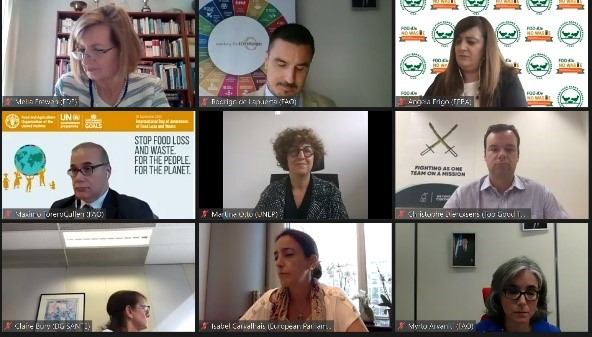The First International Day of Awareness of Food Loss and Waste
Discussion details

How much do you know about food loss and waste? To celebrate the first ever observance of the International Day of Awareness of Food Loss and Waste (IDAFLW), on the 29 September 2020, FAO Brussels hosted the dialogue "Our dream for a better planet without food loss and waste: it is possible" to answer your questions and discuss the solutions to an ethical, social and environmental disgrace.
Annually, the monetary value of food loss is around 400 billion US Dollars. And with around 690 million people currently undernourished, increasing as a result of COVID-19, this is no longer an issue that can go ignored. UNEP joined the call for action on food loss and waste, alongside representatives fromthe FAO, DG SANTE, the European Food Banks Federation (FEBA), FoodDrinkEurope, Too Good To Go and MEP Isabel Carvalhais, in the FAO Brussels event.
How does food loss and waste impact the environment? Martina Otto, Head of Cities Unit, represented UNEP in the online dialogue to discuss the negative consequences of unsustainable food systems on our environment and climate, and highlight UNEP’s actions on the issue. Food systems are a dominant user of our resources, she explained, and are responsible for around 21-37% of greenhouse gas emissions according to the IPCC. To target emission reductions, she described UNEP as a strong advocate for a holistic, systems approach from production, to processing, packaging, storage, retail, consumption and food loss & waste. Adding on to that, she explained UNEP is currently working hard to facilitate sustainable food systems policies and programmes across national and local levels, for example through the Collaborative Framework for Food Systems Transformation.
But that’s not all, Martina revealed, increasing urbanisation is resulting in additional pressure on our environment and climate. Today, our diets consist of rich and resource intense products, including ultra-processed imported food and drinks. ‘Supermarketization’, as she called it, is influencing our eating habits, in-turn affecting our food value chain and resulting in the globalisation of these resource intense diets. To overcome this, she explained to the audience, UNEP is working to support cities to adopt measures to promote urban and peri-urban farming. The aim: to revalorise food production of fresh, local, seasonal produce to influence the food consumption of city dwellers, directing them away from supermarkets. “We have lost so much touch of where our food comes from,” said Martina, explaining that with an increased valorisation of food production should come a greater opportunity to reduce food waste - “a tomato you have grown yourself you will not let rot”. She further highlighted that UNEP is working closely with schools to create edible school gardens to sensitise children to urban farming.
Food loss and waste generates 8% of all GHG emissions. Although this number may appear small, Martina explained that if policymakers add food consumption issues to their national climate plans, they could improve their mitigation and adaptation contributions from food systems by as much as 25%. There is a huge opportunity to reduce our emissions here, yet food consumption is massively overlooked in Nationally Determined Contributions (NDCs) submitted to the UNFCCC secretariat. In fact, only 11 countries included food loss in the 2015 NDCs stated Martina, and none explicitly covered food waste. To help governments reduce the climate impacts of their food systems, UNEP with the WWF, EAT and Climate Focus launched a new report ‘Enhancing Nationally Determined Contributions (NDCs) for Food Systems’ and it is no surprise amongst the first recommendations are adopt SDG 12.3 as a national target and measure food loss & waste to have a baseline in place.
Despite this potential, data is scarce. “‘Target – Measure – Act’ is key to address food waste,” she told the audience. As the custodian of SDG indicator 12.3.1.b, the food waste index, Martina explained UNEP is working hard to finalise methodology on food waste measurements for countries. Adding that “as a powerful climate measure, food consumption needs to find its way into national climate plans and their nationally determined contributions. “ Further, UNEP is modelling national food waste generation for countries that do not yet have a baseline. The audience were then told to ‘watch this space’ as she signalled publishing in early 2021.
This online event made it clear that action is needed now. But reducing food loss and waste requires the attention and action from us all, from food producers, to food supply chain stakeholders, to food industries, retailers and consumers. As a result, UNEP and the FAO have joined forces to promote more sustainable production and consumption. You can find out more here. To get involved join the digital campaign and share your Kitchen Memories!
“We all have a role to play," Ms Otto concluded, "let us preserve some of the in-home food management behaviours that we have learned with the COVID-19 lockdowns, from pre-shop planning, better storage and creative approaches to cooking. Share your #KitchenMemories, UNEP’s campaign to share food saving recipes passed on across generations.“
“KitchenMemories”, running from 29 September (IDAFLW) to 16 October (World Food Day), is an invitation to share your most precious recipes and tips on reducing food waste. The ones you learned from your grandparents, the ones that have become a family tradition, and the ones that you came across by curiously sifting through cookbooks, videos and cooking with friends.
The FAO Brussels Dialogue is available to watch here to find out more about food loss and waste!
Log in with your EU Login account to post or comment on the platform.